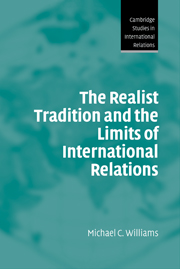Book contents
2 - Rousseau, Realism, and realpolitik
Published online by Cambridge University Press: 22 September 2009
Summary
Like Hobbes, Jean-Jacques Rousseau has long been an iconic figure in theories of International Relations. And like Hobbes his writings have often come to occupy an important symbolic role as those of an archetypal ‘Realist’ who — usually in opposition to the ‘idealism’ of Kant — correctly grasped the eternal verities of power politics and provided an especially clear formulation of the philosophical principles upon which a modern science of international politics might be constructed. Rousseau's writings on international politics, it is conventionally argued, represent the timeless insights of realpolitik, the bases of its critique of utopianism, and the tragic sense of ‘despair’ which necessarily characterises a Realist analysis of International Relations. Like many prevailing interpretations of Hobbes, however, this interpretation of Rousseau's analysis of international politics is based upon a series of conceptual, methodological, and philosophical stances which result in a seriously misleading account of the significance of Rousseau's writings for thinking about International Relations. By emphasising only particular aspects of Rousseau's thought, or by treating the writings on international politics in almost complete abstraction from his political theory as a whole, an interpretation has emerged which is little more than a caricature of his actual position.
The analysis pursued in this chapter seeks to redress some of the shortcomings of conventional appropriations of Rousseau within International Relations theory. It also, however, seeks to assess Rousseau's complex and important relationship to the wilful Realist tradition that is the concern of this book as a whole.
- Type
- Chapter
- Information
- Publisher: Cambridge University PressPrint publication year: 2005

